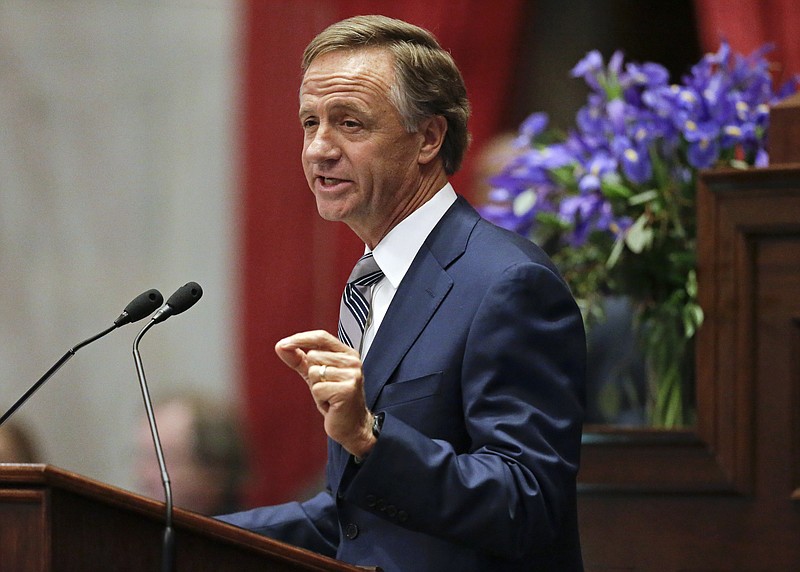Tennessee lawmakers on Thursday gave final approval to a bill criticized as anti-LGBT because it requires state courts use the "natural and ordinary meaning" of undefined words in state law.
The Senate voted 23-6 to approve the previously passed House bill. It now goes to Republican Gov. Bill Haslam.
Opponents call it the "sneaky LGBT Erasure bill" and urged Haslam to veto it.
"The Attorney General noted potential conflicts with existing law in his recent opinion" on the bill, said Chris Sanders, executive director of the Tennessee Equality Project. "Those conflicts could cause judicial confusion and discrimination against LGBTQ people in Tennessee."
He warned that "the bill makes Tennessee a target for national economic boycotts. We call on Gov. Haslam to veto the bill."
Haslam Press Secretary Jennifer Donnals said the governor "is deferred to the will of the legislature on this bill."
Asked whether that means the governor will sign or allow the bill to become law without his signature, Donnals said in an email that "like he does with all bills that come to his desk, he'll review it in its final form before taking any action on it."
Donnals did not respond to a subsequent question as to whether that indicates Haslam might veto the legislation.
During Senate floor debate, Sen. Sara Kyle, D-Memphis, was among Democrats and a few Republicans pressing the bill's sponsor, Sen. John Stevens, R-Huntingdon, about the intent of his legislation.
"I just want to know, is this aimed at the LGBT community?" Kyle asked.
Stevens maintained that "it absolutely is not."
The legislation has been pushed by Family Council of Tennessee President David Fowler, a former Republican senator from Signal Mountain. An attorney, Fowler has sought a way to force the same-sex issue into courts and, he hopes, ultimately push the U.S. Supreme Court to reconsider its landmark 2015 ruling legalizing marriage for gays and lesbians.
A somewhat similar bill got nowhere in the Legislature earlier this year. It used similar language saying undefined words "be given their natural and ordinary meaning, without forced or subtle construction that would limit or extend the meaning of the language."
It ignited a furor by including words like "husband," "wife," "father" and "mother" in the context of marriage and children.
Despite that, the sponsor of that bill, Rep. Terri Lynn Weaver, R-Lancaster, insisted it was not aimed at lesbians, gays, bisexuals and transgender persons. It was sponsored by Sen. Mae Beavers, R-Mt. Juliet, in the Senate.
In 2016, Fowler sought to intervene in a Knoxville case involving a lesbian couple's custody battle over a child conceived through artificial insemination. He was representing 53 Republican lawmakers. The judge refused.
During Thursday's Senate debate, Stevens, an attorney, said it was important for words to be taken at their long-understood meaning, saying words "mean what they meant at the time we passed the bill."
But Senate Minority Leader Jeff Yarbro of Nashville, also an attorney, said he believes it could be seen legally as "injurious."
"I appreciate the sponsor's recognition that a targeted bill would be of dubious constitutionality," Yarbro said.
But referring to the other Beavers/Weaver bill, Yarbro said that given the "origins" of such legislation, "I think it's near impossible to remove this bill from the context in which it was created."
Yarbro also raised constitutional issues of separation of powers with the legislative branch directing the judicial branch, which intreprets law, on what to do.
In his legal opinion earlier this month, Attorney General Slatery said the legislation could result in Tennessee law conflicting with the U.S. Supreme Court's same-sex marriage ruling when it comes to interpreting gender-specific words as inclusive.
But Slatery's opinion also states a judge would probably use gender-inclusive interpretations of such words.
The Associated Press quoted Stevens later telling reporters that he had "no idea" if the bill might infringe on same-sex couples' ability to have children or be married.
"If a court goes down that route, OK, they'll go down that route," Stevens said. "And this [legislative] body will be here and we'll react to it or we won't."
ACLU-Tennessee Excecutive Director Hedy Weinberg later said terms like "husband," "wife," mother" and "father" could only be interpreted as gender-specific under the legislation.
She denounced it as "vague and overly broad" and ultimately "aims "to prevent full recognition of LGBT people and undermine their treatment as equal residents of our state."
"We urge Governor Haslam to veto this bill to ensure that LGBT Tennesseans are treated equally under the law," she said in a statement.
The Knoxville case rested on a 1977 state law on artificial insemination which says a child born through those means with the consent of both husband and wife would be their legitimate child.
Slatery urged the judge to interpret "husband" and "wife" in a gender-neutral sense as "spouse." He brought the issue up again in his recent legal opinion.
Fowler, meanwhile, told reporters the legislation is necessary to prevent judges from "rewriting statutes to suit their policy agenda."
The Associated Press contributed to this report. Contact Andy Sher at asher@timefreepress.com or 615-255-0550. Follow him on Twitter @AndySher1.
